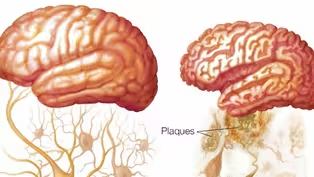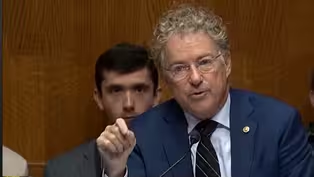
Task Force Explores Ways to Make Cafeteria Meals Healthier
Clip: Season 4 Episode 59 | 3m 27sVideo has Closed Captions
State lawmaker wants to make changes to what's allowed in school meals.
A Republican state lawmaker wants to get rid of ultra processed foods in K-12 schools, and wants a new law to do it. Some legislators say it's asking too much of school districts… but others say it's in line with a larger, nationwide movement.
Problems playing video? | Closed Captioning Feedback
Problems playing video? | Closed Captioning Feedback
Kentucky Edition is a local public television program presented by KET

Task Force Explores Ways to Make Cafeteria Meals Healthier
Clip: Season 4 Episode 59 | 3m 27sVideo has Closed Captions
A Republican state lawmaker wants to get rid of ultra processed foods in K-12 schools, and wants a new law to do it. Some legislators say it's asking too much of school districts… but others say it's in line with a larger, nationwide movement.
Problems playing video? | Closed Captioning Feedback
How to Watch Kentucky Edition
Kentucky Edition is available to stream on pbs.org and the free PBS App, available on iPhone, Apple TV, Android TV, Android smartphones, Amazon Fire TV, Amazon Fire Tablet, Roku, Samsung Smart TV, and Vizio.
Providing Support for PBS.org
Learn Moreabout PBS online sponsorshipA Republican state lawmaker wants to get rid of ultra processed foods and K through 12 schools and wants to do it by a new law.
Some legislators say it's asking too much of school districts, but others say it's in line with a larger nationwide movement.
Our Emily Sisk breaks it down in tonight's legislative update as the Make America Healthy Again Kentucky Task Force heard from the state Department of Education about school meals on Wednesday.
Nearly 80% of Kentucky's public schools receive free meals as part of the community eligibility provision.
Schools are eligible for CFP if 25% or more of their student population is directly certified.
The director said schools must follow nutritional guidelines in order to be reimbursed for the cost of meals.
That includes offering a fruit, vegetable, milk, grain and meat for lunch.
The co-chair of the task force said the problem is students don't always eat what's provided.
You give a kid going through the line, you stick an apple on their tray.
You every kid gets an apple.
You go to the end of the lunchtime, the trash cans full of apples.
How do we incentivize kids?
Not just by putting this in front of them.
How do we incentivize them to eat it?
I do think that's the million dollar question.
When children come to school and they're not used to eating healthy meals at home, they're not going to eat the healthy meals at school.
So I think it has to be a community approach.
The director said it's also the responsibility of the schools to serve foods that are flavorful and still healthy.
A Republican lawmaker took things a step further, saying he wants Kentucky to pass a bill restricting ultra processed foods in schools.
State representative Steve Doan introduced the bill during last year's legislative session, but it didn't gain much traction.
There are 11 chemical additives the legislation would prevent, including red dye 40 and yellow defines.
A lot of these things.
Are your additives in candies, your additives in confectioneries, baked goods?
Cereal sports drinks, those kinds of things.
They're not necessarily that normal nutrition that you need.
One lawmaker questioned how the bill would financially impact school districts.
In my own family, to have to buy something that has beet juice versus red dye, I'm going to pay a little bit more for it or get less quantity.
So, I'm wondering if you've done any kind of fiscal impact study on implementing and then continuing the process?
Representative Doan said he doesn't currently know what the change could cost school districts.
One Republican senator said he thinks the bill is taking things too far for school systems.
I think it's a little bit nuts to even force a school district to go buy a very expensive bags of chips and fruit chips and things like that to provide to the students.
I mean, you know, I think they can either bring their school lunch or, you know, take what's offered to them.
I don't know why we need to make this too complicated.
But Doan received support from many lawmakers who said this bill falls in line with changes already happening on the federal level.
For Kentucky edition, I'm Emily Sisk.
Thank you Emily.
Representative downs said he plans to file the bill again during the 2026 legislative session, which begins in January.
Alzheimer's Advancements and Impact on Kentuckians
Video has Closed Captions
Clip: S4 Ep59 | 5m 6s | What advancements in the fight against Alzheimer's mean for Kentucky families. (5m 6s)
How One Community is Building Up Its Neighbors
Video has Closed Captions
Clip: S4 Ep59 | 3m 6s | Program build up women through homeownership. (3m 6s)
Senator Paul Clashes with Former CDC Chief Over Vaccine
Video has Closed Captions
Clip: S4 Ep59 | 1m 46s | Sen. Paul questions need for newborns to get hepatitis B vaccine. (1m 46s)
Providing Support for PBS.org
Learn Moreabout PBS online sponsorship
- News and Public Affairs

Top journalists deliver compelling original analysis of the hour's headlines.

- News and Public Affairs

FRONTLINE is investigative journalism that questions, explains and changes our world.












Support for PBS provided by:
Kentucky Edition is a local public television program presented by KET


